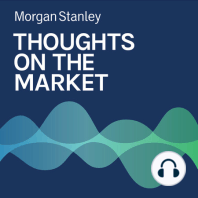3 min listen

Vishy Tirupattur: Corporate Credit Divided by Quality
Vishy Tirupattur: Corporate Credit Divided by Quality
ratings:
Length:
3 minutes
Released:
Oct 4, 2023
Format:
Podcast episode
Description
Fundamentals for investment-grade credit remain resilient and steady, while below-grade credit continues to deteriorate. ----- Transcript -----Welcome to Thoughts on the Market. I am Vishy Tirupattur, Morgan Stanley's Chief Fixed Income Strategist. Along with my colleagues bringing you a variety of perspectives, I'll be talking about our views on corporate credit markets. It's Wednesday, October 4th at 10 a.m. in New York. With the second quarter earnings now in the rearview mirror, we look at how credit fundamentals have evolved and what that means for credit investors. Quality based divergence in credit fundamental performance continues to bear out, reinforcing our preference for higher quality within the credit universe. Investment grade credit fundamentals remain resilient. Overall, issuers have held up reasonably well despite moving past the peak in the strength of balance sheet metrics. While certain metrics have started to deteriorate, most notably interest coverage as a result of higher interest rates, leverage ratios have stayed well-contained despite the uptick in debt levels. We are calling for wider spreads in investment grade credit, as the market might be overly discounting the odds of a recession, and we had already priced for a smooth soft landing. While current spread levels do not leave much room for further compression, current yield levels remain attractive at multi year highs. These levels present both a source of attractive income and potential price upside as growth and inflation cool, particularly heading into a Fed pause and potential rate cutting cycle, which our economists expect will start in March 2024. While one could argue that with spreads at tight levels, the yield demand could simply shift to treasuries. However, with very low dollar prices on most investment grade bonds and the macro optimism around a soft landing, we think investment grade credit will remain well placed for some time to come. In-place fundamentals remain strong and thus far are not flashing signs of alarm to argue for long-duration buyers of credit to shift into treasuries. On the other end of the grade spectrum, in the below investment grade segment, fundamentals have continued to deteriorate. Earnings growth turned negative, coverage metrics fell, cash to debt ratios declined, and leverage rose. The weakness was widespread across sectors, with materials and consumer discretionary sectors seeing the largest year-over-year increase in leverage. Within our high yield fundamental sample, median interest coverage dropped for a third consecutive quarter, now more than a turn below its peak in 2022. The trend was similar for loans as well, while surging interest costs were the primary driver, weaker earnings were also at play. The concentration of "tail" cohorts is rising. In high yield, the vulnerable cohort, that is companies with low coverage and low cash debt ratios, reached 5% in size, which is record high post global financial crisis. In loans, the coverage tail inflected higher for the first time in two years. Clearly, quality based divergence continues to play out in credit fundamentals, which aligns with our recommendation to be defensive and stay invested in the higher quality segments of the credit markets. Thanks for listening. If you enjoy the show, please leave us a review on Apple Podcasts and share Thoughts on the Market with a friend or colleague today.
Released:
Oct 4, 2023
Format:
Podcast episode
Titles in the series (100)
Mike Wilson: Why Trade Tensions Are Only Part of the Story by Thoughts on the Market